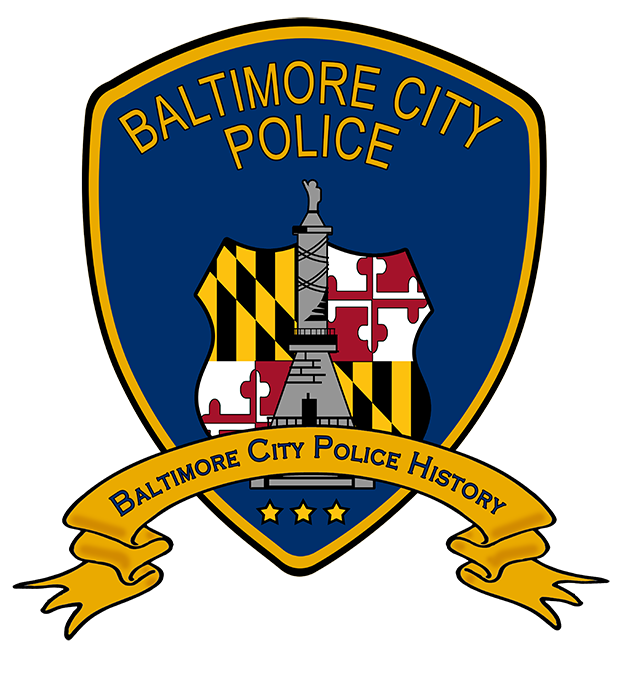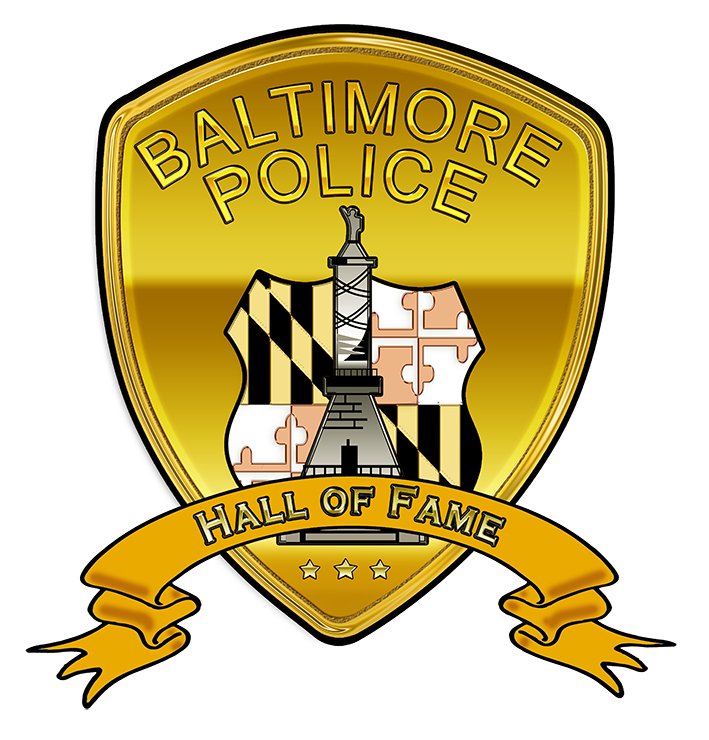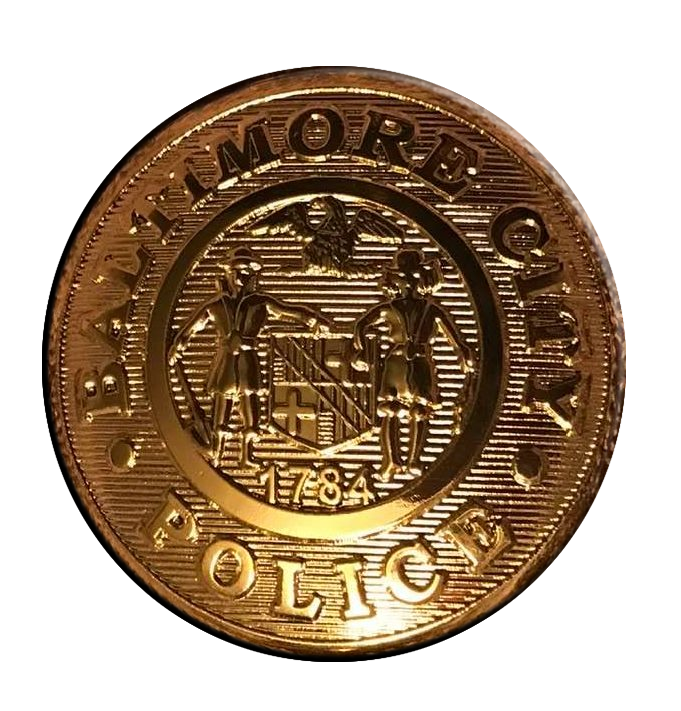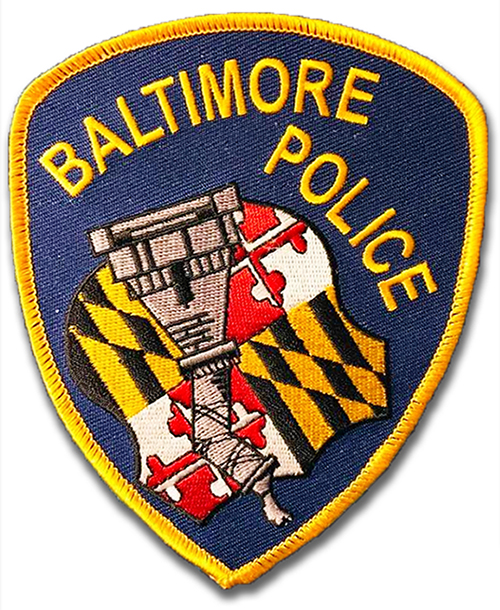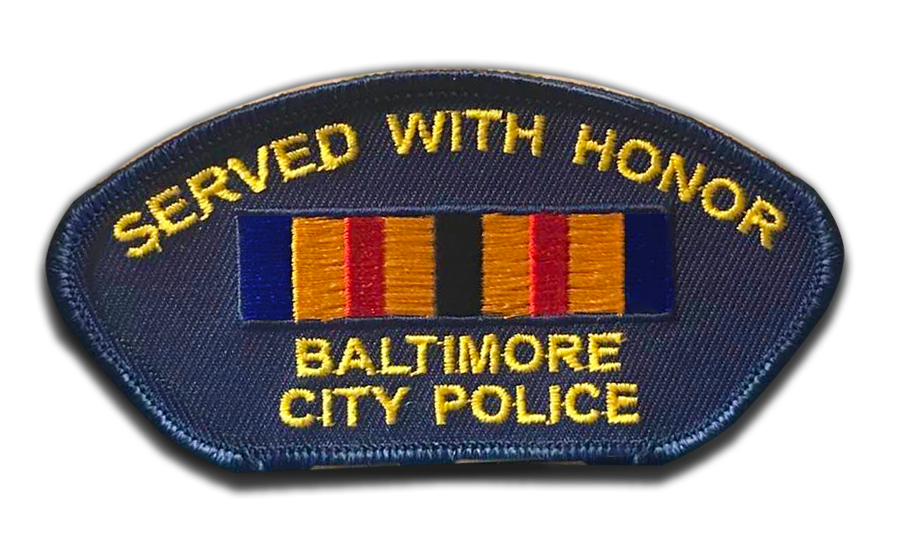Internal Investigation Division
I.I.D / I.A.D
Internal Affairs Division
"The city’s new police complaint evaluation board issued regulations yesterday (19 Nov 1965) authorizing any member to call in the state police for a “supplemental” investigation of police misconduct charges after the city police department has completed its inquiry."
On 4 May 1966 Internal Affairs, Internal Investigations, Inspectional Services, call what you want, the newspapers were calling it a Watchdog Squad with Police watching police, or police, criminals
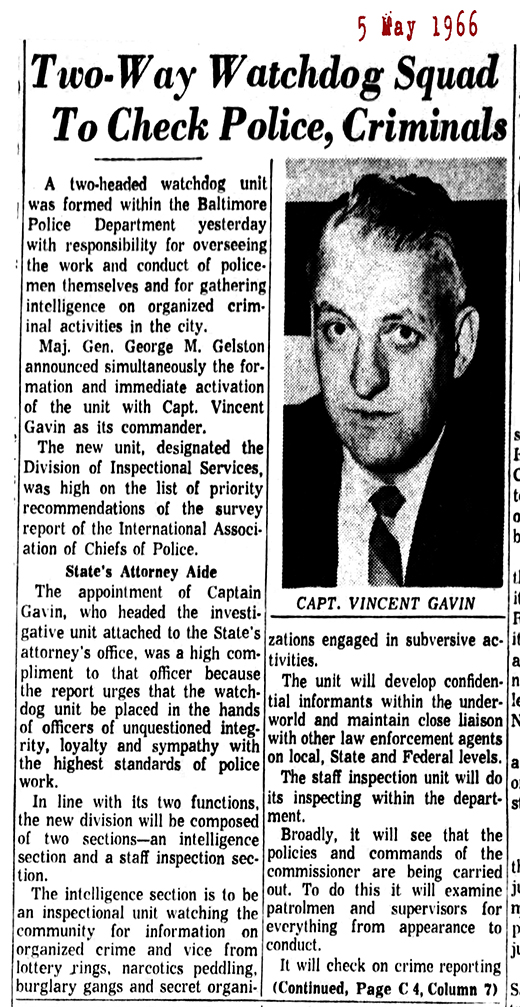
Page 1 - 1966 Article
The Article was printed on the 5th of May 1966 and in it, it says the Inspectional Services / Internal Investigation Unit started "yesterday." So, the Internal Affairs Division began on the 4th of May 1966

Page 2 - 1966 Article

Commissioner's Hepbron's Internal Investigations
19 October 1957
 Click HERE or above article to see full size article
Click HERE or above article to see full size article

“Fair Trial” of Complaint Board Urged
14 August 1965
Finan Comments on Opposition to Police Studies Set Up
Thomas B. Finan, who will be the top-ranking official on a new police complaint evaluation board, said yesterday that civil rights leaders should give the board “a Fair Trial” before condemning it. Mr. Finan, the States Attorney. General, would not comment specifically on the objections raised by Civil Rights Leaders “A number of reputable citizens have spent many hours in meetings in a conscientious effort to come up with what they believe to be an equitable procedure,” he said.
Seen “Constructive Step”
“I would feel that the time for criticism would be after the proposal has at least been given a fair trial and not before. I feel this is a constructive step and that the board will act fairly and effectively.” Spokesmen for all the major civil rights organizations in Baltimore attacked the new board on two counts: that its membership is limited to officials and has no private citizens, and that its powers are too limited to curb police abuses. Governor Tawes, who announced the formation of the board jointly with Mayor McKeldin on Thursday, had no comment on the civil rights leader’s attacks. The mayor could not be reached for response.
May Recommend Action
The board will be composed of the Attorney. General, the Baltimore City Solicitor, the Baltimore State’s Attorney’s, the Directors of the City and State Interracial Commission, and a representative of the Baltimore Police Department. It will receive complaints from citizens, review police reports on investigations of complaint, and can recommend action by the commissioner. However, it has no independent authority to hold hearings, subpoena witnesses or take sworn testimony. Its recommendations are only advisory. Final authority to judge complaints and discipline offending policeman remains in the hands of the Police Commissioner.
Finan Proposed Board
Mr. Finan himself proposed the official board last year as an alternative to a civilian review board. He suggested a membership of Atty. Gen., the city solicitor, and the states attorney. A special biracial advisory committee on police community relations adopted proposal but added the heads of the two interracial agencies in order to have African American representation. Both men now holding those post are African American.

Police Board Membership Is Criticized
16 August 1965
Inclusion of Grassroots Negro Urged by Rights Group
The Baltimore Civic Interest Group has sent telegrams to the City and State Interracial Commission asking that a meeting be called to consider including “Grassroots Negro” representation on Baltimore’s new Police Complaint Evaluation Board. The six-man board, whose formation was announced Thursday by Mayor McKeldin and Gov. talls, has drawn criticism from most of the city’s major civil rights groups because of its limited powers, and because it’s membership includes no private citizens. The board is composed of the States Attorneys General, the Baltimore State’s Attorney and City Solicitor, the director of the City and State Interracial Commissions, and the representative of the Police Commissioner. It’s power on complaints will be limited to recommending action to the Police Commissioner.
Sent by Groups Director
The telegrams, sent by James Purdy, director of the Civic Interest Group, a 150 Civil Rights Groups of Students with Adult Leadership, requested that “a meeting be called with the state and city officials said that Political Grassroots Leaders from the Black Ghetto may have the opportunity to express pertinent and Intimate Problems, and be considered for a position on the Police Review Board.” Telegrams were addressed to Paran J. Mitchell, Executive Secretary of the Maryland Commission on Interracial Problems, and Samuel T. Daniels, executive director of the Baltimore Community Relations Commission. “The civic interest group feels it is imperative that leadership must be recruited from the Grassroots Negro who can best articulate their mounting grievances and views concerning law enforcement,” the Telegram said. Civil rights groups here have pointed out that Civilian Review Boards Establishing other cities have broader powers than the Baltimore Complaint Board and usually include private citizens among their membership.
“Totally Unacceptable”
The Complaint Review Board, as set up on the recommendations of a 12-man Biracial Committee appointed last February, lacks independent authority to hold hearings, subpoena witnesses or take sworn testimony. It has been called “Totally Unacceptable” by the local chapter of the national Association for the advancement of colored people. The board has also been severely criticized by the Baltimore chapter of the Congress of Racial Equality and The Interdenominational Minister’s Alliance.

New Police Procedure Designed to Ensure for Crime Reports
8 September 1965
City Department Also to Organize an Internal Investigative Squad; Recommendations of Police Chief Unanimously Adopted A comprehensive new system to ensure full and accurate reports on crime will be instituted in the Baltimore Police Department. Furthermore, the department will soon have an Internal Investigative Squad whose full-time duties will be to look into charges of misconduct or dereliction of duty on the part of the Police Department Personnel. These two changes in the department were recommended yesterday by the survey team from the International Association of Chiefs of Police which has been studying the local department since the spring.
Unanimously adopted
They were immediately and unanimously adopted at the meeting yesterday of the Governor’s Committee to Study the Baltimore Police Department. The committee is headed by Thomas B Finan, States Attorney General. Following the meeting, which was closed, John E. Ingersoll of the Police Chiefs Group said that patrolman Baltimore had “ample opportunity to suppress reports.”He declined to estimate the percentage of crimes in the city which might be officially suppressed but said “There Were Enough to Cause us to Introduce a New Control System.”
Built in Monitoring System
“The new procedure will have a built-in monitoring system to prevent this kind of thing from happening,” he said. He estimated that about $20,000 would be needed for new equipment in the Police Department’s Central Records Bureau, in addition to three extra clerks. Mr. Finan said he would look into the matter of obtaining the additional funds for this purpose. The Internal Investigation Squad will be formed quickly to enable it to function in combination with the recently instituted Complaint Evaluation Board designed to handle citizens’ complaints against policeman.
Compromise Plan
This evaluation board was the compromise plan suggested by Mr. Finan in the face of pressure from civil rights groups for a “civilian review board,” a body of citizens outside the police department who would investigate and judge complaints of police brutality. The Evaluation Board, on the other hand, is composed of public officials in agencies dealing with law enforcement. It would see that complaints received attention but would not usurp the Police Commissioner’s soul power to hold hearings, decide the truth of charges and meat out punishments. The new Investigative Squad would be the investigative arm for this evaluation board, but it’s functions would not be limited to police “brutality” cases. In other cities where it has been instituted, the unit has handled charges of graft, bribery and thievery leveled against police personnel not only by citizens but by departmental personnel themselves. Mr. Ingersoll said the squad would fill a vacuum now existing in which rumors were charges of wrongdoing, are allowed to go unattended, a situation in which abuses are left uncorrected and unsubstantiated charges are allowed to flourish. The police chiefs the survey team created similar investigating squads in Denver, following a series of police scandals, and Miami, Chicago and Boston.
To carefully select men
Detailed plans for the operation of the squad in Baltimore have not been made, Mr. Ingersoll would not discuss the composition of the squad, except that the men would be carefully selected. Who would head the squad was also not revealed, but a likely candidate would be someone like Capt. Vincent D Gavin, who now heads the investigations for the office of the State’s Attorneys of Baltimore city. Mr. Ingersoll said that he would deliver a report on this group study of the allocation of manpower in the Police Department at a close meeting of Fanan committee about a month from now. The survey groups for report, he said, will be ready in late November.

Rules Issued for Police Complaints
20 Nov 1965
A Board Member May Ask the State Officer to Make Extra Probe
The city’s new police complaint evaluation board issued regulations yesterday (19 Nov 1965) authorizing any member to call in the state police for a “supplemental” investigation of police misconduct charges after the city police department has completed its inquiry. However, the regulations bar any member from investigating complaints personally or through any other agency. The Board’s rules were issued yesterday (19 Nov 1965) in the form of a police department General Order distributed to all policemen.
Procedures Noted
They set forth procedures for handling citizens’ complaints against police. The board’s jurisdiction is limited to “those alleged offenses which fall within the purview of discourteous, abusive, and/or brutal conduct toward a member of the public.” With the issuance of the order, the complaint board officially began to function. It was created 12 August 1965 by Mayor McKeldin and Governor Tawes, on the recommendation of their jointly appointed biracial advisory committee on police-community relations. The procedures outlined in the order were unanimously adopted at the board’s organization meeting last week Commissioner Bernard J. Schmidt, was reported to have given informal approval of the draft before it was submitted to the board.
Criticism Recalled
The provision for the State Police review of city police investigations was viewed as a response to criticism by civil rights leaders, who complained the creation of the board still left the police department investigating charges against its own members. The order was signed by chief inspector George J. Murphy, who is acting Commissioner during Commissioner Schmidt’s illness. The board has only advisory powers. The police Commissioner remains exclusive authority to discipline policeman. Joseph Alan, city solicitor, as temporary chairman of the board. The other members are the Atty. Gen., the Baltimore state’s attorney, the director of the city and state interracial commissions, and a police department representative.
Weeks of Controversy
the regulations issued yesterday were the subject of weeks of controversy. They were reportedly rewritten more than a half-dozen times before unanimous agreement was reached. Under the procedures outlined in the order, complaints will be received by the legal aid office, which is in the People’s Court building, or at the city’s nine police districts. Complaints must be registered on printed forms, which will be numbered so the board can make sure it receives all complaints that are filed. Copies of complaints will go to the board and to the chief inspector. After the Police Department has investigated the charge, the inspector must report back to the board his findings and his recommendations. The rules give the department 30 days to make either a recommendation or a report on the status of the investigation. If the inquiry is not complete at the end of 30 days, the inspector must continue reporting at 15 – day intervals. The board can either accept the inspector’s recommendations or suggest some other action. Any member who was unsatisfied with the police department report can call a conference at which the report will be discussed by the board and the inspector. The board can recommend dismissal of a complaint or at can recommend disciplinary action. Any action requires a majority vote of the six board members. The bar one individual investigations by members applies to every case except where the states attorney is investigating “to determine whether any criminal prosecution is warranted.” The regulations prohibit members from disclosing anything “contained in investigation report.” The board itself, by a majority vote, may make reports public. Complaints received at the police stations must be sent to the legal aid Bureau, which is responsible for putting copies in hands of the board and the chief inspector.
Sharp Criticism
the board was sharply criticized by civil rights leaders when it was first created. African-American spokespersons objected to its limited powers and particularly to the lack of any provision for independent investigations of charges against police. They also criticize the board’s makeup because no private citizens were appointed to serve with the officials on the board.

17 December 1965
Paid with Jewelry
Police said, "Barnes claimed he paid off some policemen with stolen jewelry in return for leniency in criminal cases pending against him." It is believed also that he has provided information in the theft of $100,000 worth of jewelry last summer from the home of a Washington Society Hostess, by the name of Mrs. Morris Cafritz. Barnes was in jail at the time of the theft. The case has not been solved. Barnes’ allocations are being investigated by a Grand Jury, the Police Department Internal Investigation Division, and a group of Insurance Underwriters.

POLICE INFORMATION
If you have copies of: your Baltimore Police Department Class Photo, Pictures of our Officers, Vehicles, Equipment, Newspaper Articles relating to our department and or officers, Old Departmental Newsletters, Lookouts, Wanted Posters, and or Brochures. Information on Deceased Officers and anything that may help Preserve the History and Proud Traditions of this agency. Please contact Retired Detective Kenny Driscoll.
This email address is being protected from spambots. You need JavaScript enabled to view it.

NOTICE
How to Dispose of Old Police Items
Please contact Det. Ret. Kenny Driscoll if you have any pictures of you or your family members and wish them remembered here on this tribute site to Honor the fine men and women who have served with Honor and Distinction at the Baltimore Police Department. Anyone with information, photographs, memorabilia, or other "Baltimore City Police" items can contact Ret. Det. Kenny Driscoll at This email address is being protected from spambots. You need JavaScript enabled to view it. follow us on Twitter @BaltoPoliceHist or like us on Facebook or mail pics to 8138 Dundalk Ave. Baltimore Md. 21222
Copyright © 2002 Baltimore City Police History - Ret Det Kenny Driscoll
You May Like

